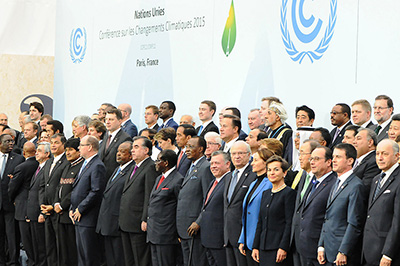U.S. commences process to exit from the Paris Agreement
Earlier this week, the White House followed up on President Trump’s June 2017 commitment for the United States to exit the Paris Agreement.
The Paris Agreement by the United Nations Framework Convention on Climate Change (UNFCC) requires each of the 197 participating countries to strengthen the global response to the threat of climate change by keeping a global temperature rise this century well below 2 degrees Celsius above pre-industrial levels and to pursue efforts to limit the temperature increase even further to 1.5 degrees Celsius. It also aims to strengthen the ability of countries to deal with the impacts of climate change. To reach these ambitious goals, appropriate financial flows, a new technology framework and an enhanced capacity building framework will be put in place, thus supporting action by developing countries and the most vulnerable countries, in line with their own national objectives. The nonbinding agreement also provides for enhanced transparency of action and support through a more robust transparency framework.
Secretary of State Mike Pompeo said in a statement that the nation’s withdrawal from the agreement will take effect one year from delivery of the notification, which will be November 4, 2020.
Pompeo cited President Trump’s rationale for exiting the Paris Agreement, pointing to the “the unfair economic burden imposed on American workers, businesses, and taxpayers by U.S. pledges made under the Agreement.” And he added that the U.S. has reduced all types of emissions, while growing the economy and ensuring citizens’ access to affordable energy. As examples of that, he pointed to U.S. emissions of criteria air pollutants that impact human health and the environment declined by 74% between 1970 and 2018. U.S. net greenhouse gas emissions dropped 13% from 2005-2017, even as our economy grew over 19 percent.
“The U.S. approach incorporates the reality of the global energy mix and uses all energy sources and technologies cleanly and efficiently, including fossils fuels, nuclear energy, and renewable energy,” said Pompeo. “In international climate discussions, we will continue to offer a realistic and pragmatic model – backed by a record of real world results – showing innovation and open markets lead to greater prosperity, fewer emissions, and more secure sources of energy. We will continue to work with our global partners to enhance resilience to the impacts of climate change and prepare for and respond to natural disasters. Just as we have in the past, the United States will continue to research, innovate, and grow our economy while reducing emissions and extending a helping hand to our friends and partners around the globe.”
While on the campaign trail, President Trump called the Paris Agreement “a bad deal for the U.S.,” while saying clean air and crystal clear water are important.
As for how large United States-based businesses felt about the agreement, it is clear that they wanted things to remain the same and not see the U.S exit it.
In a letter sent to President Trump on April 26, 2017, 16 companies, including Apple, DuPont, General Mills, Google, Intel, and Walmart, among others, pleaded their case for why the U.S. should remain in the agreement.
“Climate change presents U.S. companies with both business risks and business opportunities,” the letter stated. “U.S. business interests are best served by a stable and practical framework facilitating an effective and balanced response. We believe the Paris Network provides such a framework.”
Jason Mathers, Environmental Defense Fund (EDF) Senior Manager, Supply Chain Logistics, previously told LM his organization sees the agreement as being incredibly important, because it has ambition, is global in scope and provides a very broad framework.
And Nathaniel Keohane, EDF Senior Vice President, Climate, said this week that the landmark Paris Agreement was a good deal for the United States and the climate the day it was signed, and it remains a good deal for the United States and the climate.
“If anything has changed since the president first announced his intentions in 2017, it’s that we have even more evidence that the climate crisis is upon us and that American voters are increasingly saying climate action is a priority for them, too,” he said. “The Paris Agreement was made possible through U.S. leadership. By withdrawing, the United States abandons its allies in the fight against climate change. It’s yet another instance of Trump acting counter to U.S. interest in foreign policy. He’s sacrificing a stable future for our children to serve his narrow political interests.
He added that the American people want action to solve climate change, calling the U.S. withdrawal from the Paris Agreement a reckless decision that threatens our economy and our future prosperity.













